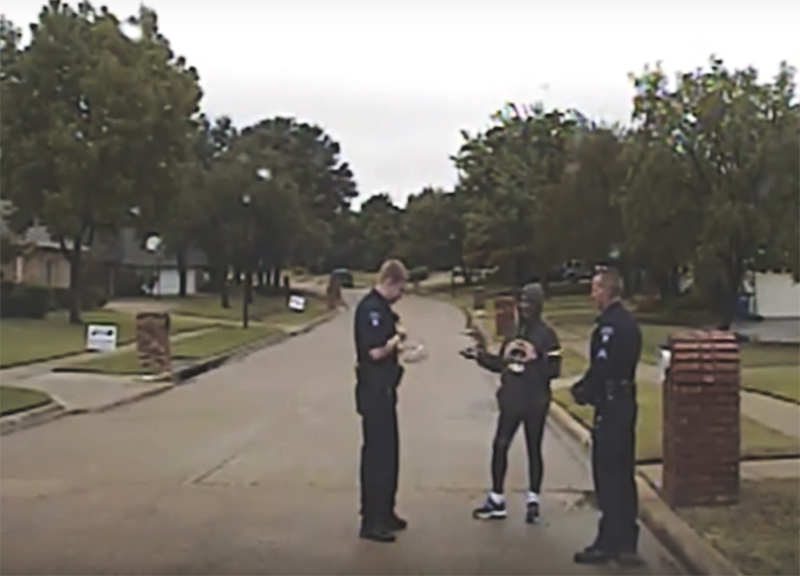UNT Distances Itself From Journalism Dean Dorothy Bland's Op-Ed About Racial Profiling.
On what seemed to be a fairly innocuous Saturday morning in late October, the dean of the University of North Texas' school of journalism, Dorothy Bland, went on a routine walk through her neighborhood in Corinth.
During her morning walk, Bland, a black woman, was stopped by two officers. She was exercising in the street, which is not a particularly safe thing to do. After she was stopped, police asked for Bland's identification.
That interaction between Bland and the officers then made its way into the Dallas Morning News by way of an op-ed from Bland herself. In the editorial, Bland accused the police of racial profiling. Corinth police chief Debra Walthall responded to the editorial saying the stop was in regards to Bland's safety — not her race — and that, by asking for Bland's identification, police were just following protocol.
If nothing else, Bland's editorial has spawned some new discussions in the ongoing conversation about race relations in America and how police fit into it. That's all fine and good: Police brutality is a real and important issue.
And, just like clockwork, two prominent camps have formed in the aftermath of her piece's publication. One sees Dorothy Bland as a victim of racism. The other sees her complaint as part of some race-baiting, liberal agenda.
Now, here's the thing: Bland's editorial doesn't 100 percent hold up to what is released in dash cam footage. In fact, questions about the veracity of her account are so widespread that there's even a Snopes investigation into the matter. So where does she go wrong? Well, the “flashing lights and sirens” she uses in her lede are fairly evocative, but they don't paint an entirely accurate tableau of what happened that morning. What do we chalk this up to? Bad memory? The embellishment of a memoirist? An outright lie? Take your pick. It's a hell of a lede. But it's also false.
So what comes next? For one thing, a fight for her job, maybe. A change.org petition calling for her firing has already reached over 3,900 signatures at the time of this writing. The petition claims that Bland is poorly and inaccurately representing UNT.
Meanwhile, on Tuesday evening, UNT released a statement via Facebook in which it distanced itself from Bland's editorial. Here is that statement, in part:
UNT encourages our administrators, faculty and staff members to measure the gravity of their rights and obligations as a private citizen in light of their responsibilities to their individual professions, the university, and our students. When administrators and faculty and staff members speak and act as private citizens they should make clear that they are not speaking or acting on behalf of the university.
UNT encourages individuals to read the columns that ran in the Dallas Morning News, and then watch the video to draw their own conclusions.
You can read the statement — and its hellish comments section — in full here.
Criticizing Bland for using her title in the editorial's bio is a bit ludicrous. If she penned a National Magazine Award-winning piece for Vanity Fair, UNT would want “Dorothy Bland is the dean of the Frank W. and Sue Mayborn School of Journalism” at the bottom of that piece.
More cutting than UNT in criticizing Bland, though, is former Dallas mayor Ron Kirk, who was so incensed by Bland's piece that he called up the Dallas Morning News to complain about it on the record. Kirk bluntly called Bland's exchange with the police a “nonstory.” Here, though, is where he really hits the head: “This country is wrestling with very real concerns regarding the police treatment of African-American youth. She took advantage of a very innocent and thoughtful police response — walk on the right side of the street — she's just looking for her Skip Gates moment. There's a real danger here.”
Asserting that Bland was searching for her Henry Louis Gates Jr. moment is a bit flippant, but Kirk's not wrong in saying that this whole fiasco is damaging to “the cause.”
Dorothy Bland says she was reminded of Sandra Bland (no relation) in her police stop. But there's a key difference between these interactions. The police in Corinth behaved almost precisely as Black Americans so desperately want them to. A cordial, respectful response intended to protect and serve citizens rather than punish them? That's the aim, right?
Being Black and responding to racism is tough. It can give you a form of post-traumatic stress disorder. It'll set off all your triggers. Drop a book around a soldier and they might start to freak out. Put a hand on the shoulder of a victim of domestic violence and they might break down. Repeatedly show Black Americans law enforcement officers abusing the criminal justice system and they're gonna worry about violations of their rights.
In that regard, the video of Bland's stop may very well be a Rorschach test of sorts, psychologically bringing out viewers' already rock-solid opinions on police, the third-most-trusted institution in the country.
So maybe Bland overreacted. But it's best to understand why she might have done so. Like it or not, policing is a real problem in America.
Bland's story doesn't discredit the hundreds of thousands of other valid ones, nor does it stand as a testament against the systemic racism we see in police departments throughout the country.
Maybe there's indeed nothing to see here with Bland's kerfuffle. But open your eyes and you'll see plenty of evidence about where we're going wrong as a nation elsewhere.


















































